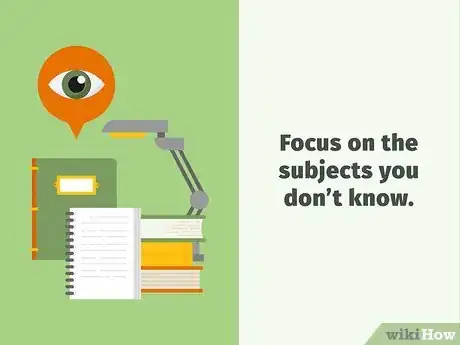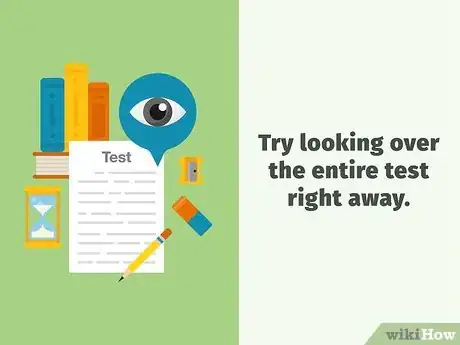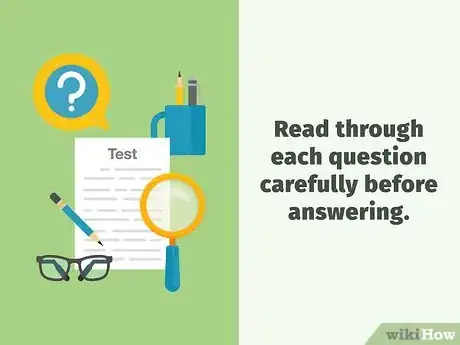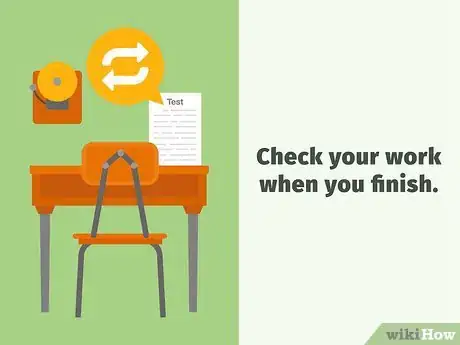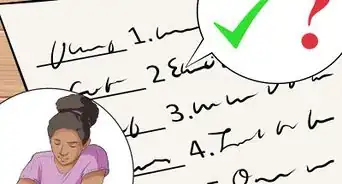This article was co-authored by Ted Dorsey, MA and by wikiHow staff writer, Hunter Rising. Ted Dorsey is a Test Prep Tutor, author, and founder of Tutor Ted, an SAT and ACT tutoring service based in Southern California. Ted earned a perfect score on the SAT (1600) and PSAT (240) in high school. Since then, he has earned perfect scores on the ACT (36), SAT Subject Test in Literature (800), and SAT Subject Test in Math Level 2 (800). He has a BA in English from Princeton University and a MA in Education from the University of California, Los Angeles.
There are 12 references cited in this article, which can be found at the bottom of the page.
wikiHow marks an article as reader-approved once it receives enough positive feedback. This article received 11 testimonials and 89% of readers who voted found it helpful, earning it our reader-approved status.
This article has been viewed 832,745 times.
We’ve all been there: a teacher announces an upcoming test, and you start to worry about how you'll do. Maybe you feel unprepared, or maybe you just want to make sure you perform as well as you possibly can. Either way, the good news is that you're already on the path to an A -- you're here, looking for info on how to nail that test! Whether you have plenty of time left to study or you're down to wire, we can help you set yourself up for success.
Things You Should Know
- Take notes in class and review the material, focusing on any subject you don’t know and rewriting key concepts in your own words.
- Form a study group where you can take practice tests, and ask your teacher what to expect; psych yourself up with positive affirmations too.
- Look over the whole test right away and start with the easiest questions, reading through everything carefully and checking your work after.
Steps
Community Q&A
Did you know you can get answers researched by wikiHow Staff?
Unlock staff-researched answers by supporting wikiHow
-
QuestionWhat do I do if I dont understand? 😢😕
 wikiHow Staff EditorThis answer was written by one of our trained team of researchers who validated it for accuracy and comprehensiveness.
wikiHow Staff EditorThis answer was written by one of our trained team of researchers who validated it for accuracy and comprehensiveness.
Staff Answer wikiHow Staff EditorStaff Answer
wikiHow Staff EditorStaff Answer -
QuestionHow many days before the test should you start preparing?
 wikiHow Staff EditorThis answer was written by one of our trained team of researchers who validated it for accuracy and comprehensiveness.
wikiHow Staff EditorThis answer was written by one of our trained team of researchers who validated it for accuracy and comprehensiveness.
Staff Answer wikiHow Staff EditorStaff Answer
wikiHow Staff EditorStaff Answer -
QuestionHow do I raise my grade in a two week period?
 Community AnswerIf you have a test, you could study really hard to get your grades up. But if that's not the case, make sure to bring in your homework every day because teachers can give you bad grades for not bringing homework. Behave well, as some teachers bring down your grades for misbehaving in class. Do everything you can to get on your teacher's good side and try hard in every class.
Community AnswerIf you have a test, you could study really hard to get your grades up. But if that's not the case, make sure to bring in your homework every day because teachers can give you bad grades for not bringing homework. Behave well, as some teachers bring down your grades for misbehaving in class. Do everything you can to get on your teacher's good side and try hard in every class.
Warnings
- Never cheat on a test since you can get in serious trouble with your school.⧼thumbs_response⧽
References
- ↑ https://kidshealth.org/en/teens/take-notes.html
- ↑ https://learningcenter.unc.edu/tips-and-tools/effective-note-taking-in-class/
- ↑ https://kidshealth.org/en/teens/test-terror.html
- ↑ https://www.usa.edu/blog/study-techniques/
- ↑ https://psychology.ucsd.edu/undergraduate-program/undergraduate-resources/academic-writing-resources/effective-studying/index.html
- ↑ https://www.usa.edu/blog/study-techniques/
- ↑ https://learningcenter.unc.edu/tips-and-tools/taking-notes-while-reading/
- ↑ https://eccles.utah.edu/news/5-tips-for-an-effective-study-group/
- ↑ https://www.surrey.ac.uk/features/sleep-tips-exam-success
- ↑ https://blog.suny.edu/2013/12/scientifically-the-best-ways-to-prepare-for-final-exams/
- ↑ https://blog.suny.edu/2013/12/scientifically-the-best-ways-to-prepare-for-final-exams/
- ↑ https://kidshealth.org/en/teens/testing-tips.html
- ↑ https://kidshealth.org/en/teens/testing-tips.html
- ↑ https://learningcenter.unc.edu/tips-and-tools/taking-notes-while-reading/
- ↑ http://esl.fis.edu/learners/advice/tests.htm
About This Article
To ace a test, even if you're not prepared, start by glancing over the test before you get started to get an idea of how long it is so you can manage your time better. Then, read through each question twice and try to answer it. If you can't answer a question, skip it and come back to it later if you can, which will save you from wasting all of your time on one question. If your test is multiple choice and you don't know the answer, eliminate 2 answers so you're left with just 2 options. Then, guess if necessary since you'll have a 50-percent chance of being right. To learn how to study effectively so you ace your test, scroll down!



